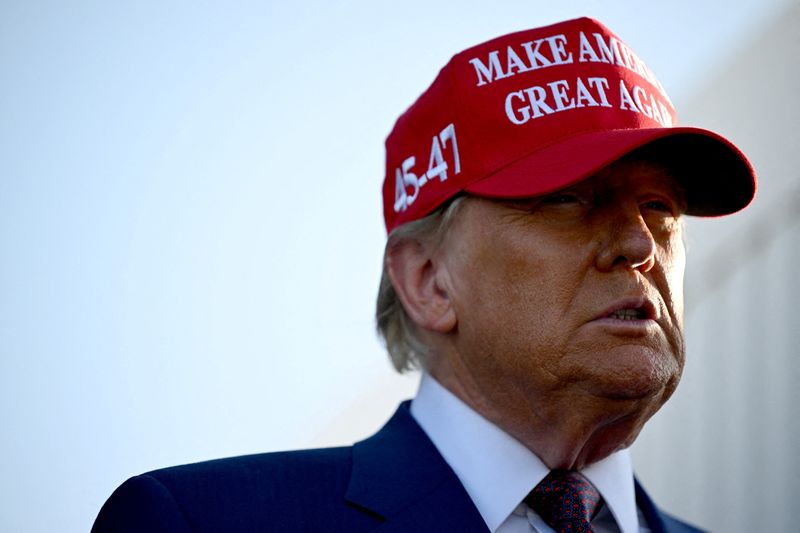
How investments may fare during Trump 2.0 and Fed easing
By Saqib Iqbal Ahmed
NEW YORK (Reuters) – U.S. investors are preparing for a swathe of changes in 2025, from tariffs and deregulation to tax policy, that will ripple through markets as President-elect Donald Trump returns to the White House, putting the focus on whether the U.S. economy can continue to outperform.
The changing of the guard in Washington has big implications for how stocks, bonds and currencies fare in the new year and may require investors to rejig portfolios.
Forecasts call for another buoyant year for stocks, the dollar to maintain its recent strength over the coming months and Treasury yields to march higher.
Here is a chart-based overview of key market themes and segments that investors are closely monitoring:
U.S. EXCEPTIONALISM
Investors largely expect U.S. economic exceptionalism to persist in the new year, as robust consumer spending and a resilient labor market put U.S. growth on a firmer footing than that of many of its developed market peers.
The U.S. economy is expected to find further support from any potential tax reform, including a reduction in the corporate tax rate. Such tax cuts – which would need to pass Congress – could support company earnings and sentiment on stocks.
In contrast, although the euro-zone economy grew faster than anticipated in the third quarter, its outlook remains weak due to potential large tariffs from the Trump administration, escalating trade tensions with China and low consumer confidence.
“We do expect U.S. growth to outperform the rest of the world in 2025, on the back of potentially favorable monetary and fiscal policy,” said Sonu Varghese, global macro strategist at Carson Group.
THE FED
Front and center for investors in 2025 is how rapidly or deeply the U.S. Federal Reserve can cut rates. The Fed cut rates in December, continuing reductions after a period of aggressive rate hikes, but indicated it would slow the pace of further cuts.
Stocks have been buoyed by expectations of easier monetary policy. But with benchmark Treasury yields rising sharply after the Fed meeting, the rate outlook threatens to undermine the momentum for stocks.
KING DOLLAR
Dollar bears have taken a battering this year and most FX market strategists forecast continued strength for the greenback.
Many of the factors that powered a 7% gain for the currency against a basket of peers this year, including relatively robust U.S. economic growth and rising Treasury yields, are expected to continue supporting the dollar.
Trump’s tariffs and protectionist trade policies are also likely to bolster the buck.
Prospects of heightened inflation could also hinder the Fed from keeping up with interest-rate cuts, even as other central banks proceed with cuts, further lifting the dollar.
Getting the dollar’s trajectory right is crucial for investors, given the currency’s central role in global finance.
A strong dollar could weigh on the outlook for U.S. multinationals as well as complicate other central banks’ efforts to fight inflation as it makes their currencies cheaper.
“Another year of spectacular gains in the dollar might break something in the global economy – but with major uncertainties clouding the horizon and another round of American exceptionalism largely priced in, further outperformance could be difficult to achieve,” said Karl Schamotta, chief market strategist at payments company Corpay.
VOLATILITY WATCH
Investors got a taste on Wednesday of how quickly market stability can shift to turmoil. U.S. stocks fell sharply after the Federal Reserve projected fewer interest-rate cuts than expected and as concerns grew about a potential partial government shutdown.
Global financial markets may extend generally tranquil trading conditions into the new year but analysts warn that a volatility shock is overdue.
Analysts at BofA Global Research said they do not expect a repeat of the record-low stock-market volatility levels set in 2017, the beginning of Trump’s first term.
FX markets could be in for higher volatility next year as the twin forces of tariffs and central-bank actions come to bear.
“The shock absorber in financial markets is going to be foreign exchange next year,” said Fredrik Repton, senior portfolio manager with the global fixed income and currency management teams at Neuberger Berman.
CRYPTO FEVER
The speculative fever that gripped bitcoin and crypto-related stocks in 2024 is unlikely to abate in the new year, strategists said.
“2024 was a banner year for speculation, which had morphed into a self-fulfilling frenzy in recent weeks,” Steve Sosnick, chief strategist at Interactive Brokers (NASDAQ:IBKR).
While these trades have sometimes run into trouble, most recently after the Fed’s December meeting, investors have been willing to buy the dip.
“When something has been working for so many people for so long, they are loath to give it up,” Sosnick said.
And work the trades have. Bitcoin hit a record high above $100,000 in December on expectations that Trump’s election will usher in a friendly regulatory environment for cryptocurrencies.
Crypto-related stocks have also been on a tear, with software company and bitcoin stockpiler MicroStrategy leading the charge with a more than 400% rise for the year.

